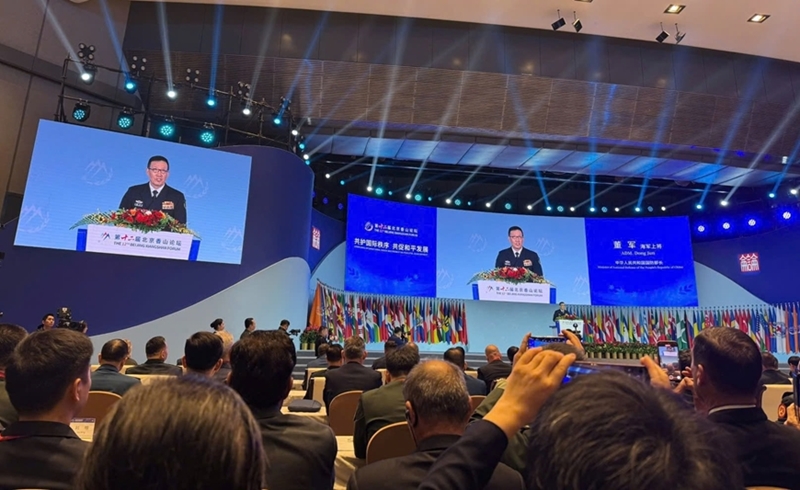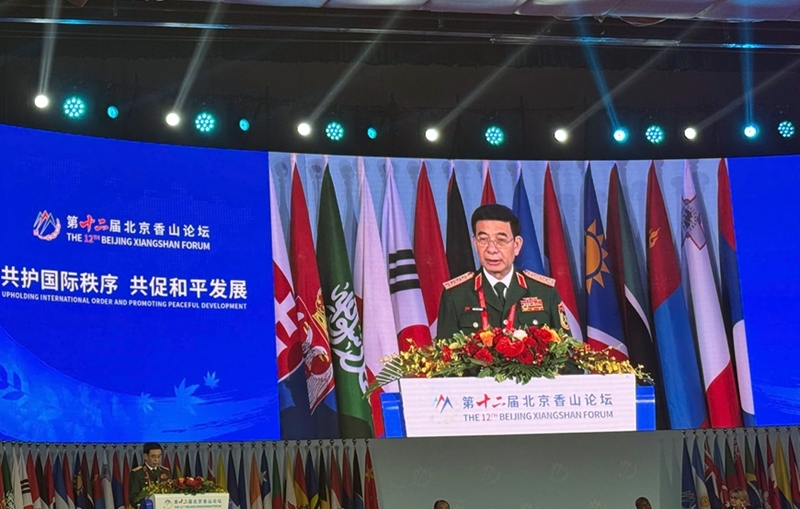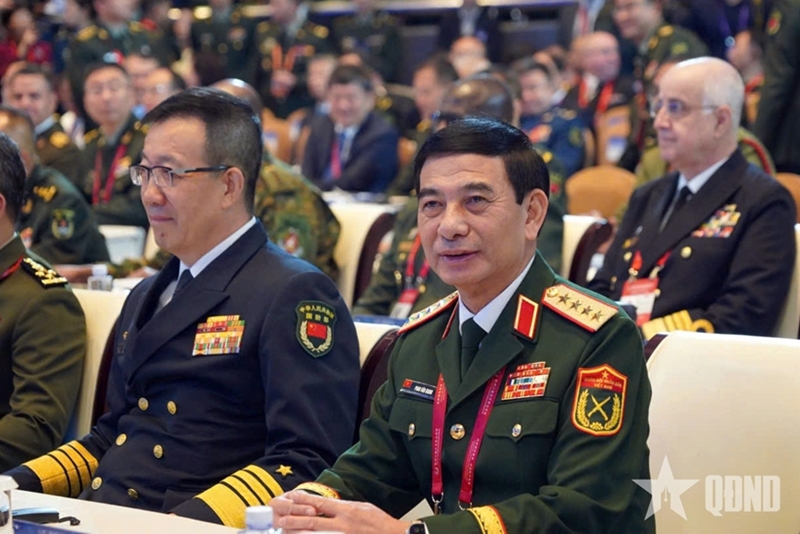Held from September 17 to 19 under the theme “Upholding International Order and Promoting Peaceful Development,” this year’s forum consists of four plenary sessions and eight concurrent sessions. As in previous editions, it has attracted senior defense leaders, military officers, experts, and scholars from numerous countries and international organizations.
    |
 |
|
Sr. Lt. Gen. Dong Jun addressing the opening of the 12th Beijing Xiangshan Forum |
In his opening speech, Chinese Defense Minister Senior Lieutenant General Dong Jun stressed that China seeks to contribute to a brighter future for human civilization. As humanity enters a new phase of development, he stressed that respecting history, striving for a peaceful future, and advancing collective development in line with the trends of the era are essential. He emphasized that the Chinese military is ready for dialogue and cooperation to pursue long-term solutions for peace, security, stability, and advancement in the region and the world. Although peace remains the main trend of the times, the world is still facing complex challenges, and the armed forces are a vital pillar in protecting peace and justice.
The Chinese defense chief outlined four major directions. The first one is upholding historical values. The second is reforming and improving global governance. He emphasized China’s desire to work with international partners to build a fairer and more rational global governance framework, with respect for national sovereignty as a core principle.
Regarding the East Sea (aka South China Sea), he noted that China is working with regional countries to advance the process of developing the Code of Conduct in the East Sea (COC) and to fully implement the Declaration on the Conduct of Parties in the East Sea (DOC), with many areas of consensus already achieved. He reaffirmed China’s support for multilateralism in a multipolar world and said that the Chinese military is ready to cooperate to protect common development and collective security.
The third direction is safeguarding peace and justice. China underlined that it seeks to be a partner rather than an ally in military linkages, promoting the resolution of security challenges through unity and cooperation, thereby contributing to global peace and stability.
The last one is consolidating peace through practical actions. China pledged to strengthen multilateral coordination, foster strategic trust among armed forces, and reinforce defense and security cooperation mechanisms in a spirit of transparency, solidarity, mutual trust, and shared development.
    |
 |
|
Vietnamese Defense Minister Phan Van Giang speaks at the first plenary session. |
Speaking at the first plenary session, General Phan Van Giang emphasized that we are living in a special era full of turmoil but also full of opportunities. On the one hand, humanity has never had such outstanding scientific and technological achievements as it has today. The fourth Industrial Revolution, artificial intelligence, digital technology, biotechnology, and renewable energy are opening up unprecedented development possibilities. These advances allow all nations, large or small, to narrow gaps and join the common development flow of the world.
On the other hand, along with opportunities come extremely fierce challenges. On the international level, strategic competition, unilateralism, and power politics are profoundly impacting the structure and governance of global security, while regional flashpoints and territorial disputes still carry risks of escalation. Alongside traditional threats, the world also faces increasingly complex non-traditional challenges.
The Vietnamese defense leader stressed that building a fair and rational global security governance system requires multilateralism and substantive defense cooperation. He added that only when nations sit together, respect common rules, and share responsibilities, can fundamental principles be translated into reality. In today’s environment, where traditional and non-traditional security challenges are increasingly intertwined, multilateralism is not just an option, it is the only path to sustain peace and stability. Defense cooperation, pursued with transparency, self-defense, and the common good in mind, will serve as an important bridge between principles and action.
He affirmed that Vietnam supports multilateralism based on the U.N. Charter and international law, inclusive and equitable, centered on people, and serving the common interest of the global community. This is not merely a method of cooperation, he explained, but the very foundation for nations to coexist peacefully and prosper in an increasingly interconnected and complex world. As a peace-loving country, Vietnam deeply understands the values of international cooperation and global solidarity, a spirit reflected in many of the country’s major policies and decisions.
Given today’s uncertainties, he said that maintaining and strengthening multilateralism is a vital and decisive factor in addressing global challenges that no single country can effectively handle alone. He suggested persistently promoting multilateralism to ensure a global security structure rooted in the fundamental principles of the U.N. Charter, especially respect for independence, sovereignty, territorial integrity, and political systems; non-interference in internal affairs; and peaceful dispute settlement. He also called for substantive cooperation on global issues, particularly in non-traditional security fields such as climate change, cyber security, food security, energy security, artificial intelligence, counter-terrorism, and transnational crime.
He emphasized the need to modernize multilateral institutions, advocating U.N. reform, especially of the Security Council, to enhance its ability to respond promptly to global crises while ensuring the voices of small states and developing countries are fully heard in international forums. He suggested strengthening of dialogue, mutual understanding, and shared responsibility between major powers, between large and developing countries, and across civilizations and ideologies, to build a shared future where differences become opportunities to narrow divides and complement one another. He called on nations and international organizations to be firmly committed to and act decisively to jointly build an open and inclusive mechanism, especially flexible mechanisms for defense, security, and diplomatic dialogue and consultation.
General Phan Van Giang underscored that to translate these directions into reality requires a strong, widely respected, and universally valid foundation that is international law. He reaffirmed Vietnam’s commitment to being a reliable partner, an active and responsible member of the international community, contributing to collective efforts of building a rules-based, fair, and sustainable international order.
    |
 |
|
Vietnamese Defense Minister Phan Van Giang at the first plenary session (right, front line) |
Also in his speech, the Vietnamese defense leader expressed appreciation for the support and participation of defense leaders and defense industry partners from other countries at the Vietnam Defense Expo in 2024. He thanked countries for sending delegations, particularly those that dispatched forces to participate in military parades marking the 50th anniversary of the South Liberation and National Reunification, and the 80th anniversary of the August Revolution and National Day.
The timely and substantive address of Vietnam’s Minister of National Defense drew particular attention from delegates attending the 12th Beijing Xiangshan Forum.
Reported by Thu Trang - Van Duyen (from Beijing, China)
Translated by Tran Hoai